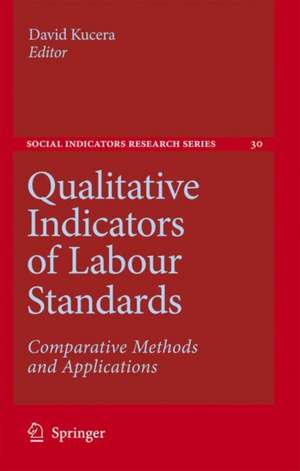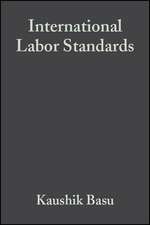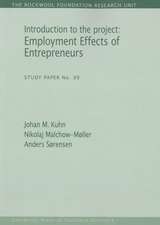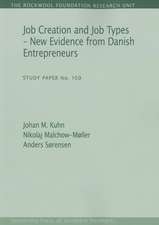Qualitative Indicators of Labour Standards: Comparative Methods and Applications: Social Indicators Research Series, cartea 30
Editat de David Kuceraen Limba Engleză Hardback – 7 mai 2007
Qualitative indicators, while generally having numerical values, are based on such methods as grading by experts, the coding of legislation, and the coding of other textual sources addressing violations of a more de facto nature. Measuring compliance with labour standards is an undertaking intrinsically fraught with difficulty. For there are a number of possible sources of measurement error, both random and non-random, that are unique to such indicators, on top of those that affect qualitative and quantitative indicators alike. The growing use of qualitative indicators of labour standards thus raises a number of questions about comparative methods of construction as well as the appropriateness of particular methods for particular applications. This volume results from a seminar that was organized to address these and related questions.
| Toate formatele și edițiile | Preț | Express |
|---|---|---|
| Paperback (1) | 640.88 lei 6-8 săpt. | |
| SPRINGER NETHERLANDS – 22 noi 2010 | 640.88 lei 6-8 săpt. | |
| Hardback (1) | 648.89 lei 6-8 săpt. | |
| SPRINGER NETHERLANDS – 7 mai 2007 | 648.89 lei 6-8 săpt. |
Din seria Social Indicators Research Series
- 15%
 Preț: 601.13 lei
Preț: 601.13 lei - 5%
 Preț: 861.64 lei
Preț: 861.64 lei - 18%
 Preț: 945.47 lei
Preț: 945.47 lei - 15%
 Preț: 644.30 lei
Preț: 644.30 lei - 18%
 Preț: 959.50 lei
Preț: 959.50 lei - 15%
 Preț: 645.60 lei
Preț: 645.60 lei - 18%
 Preț: 1234.94 lei
Preț: 1234.94 lei - 15%
 Preț: 640.06 lei
Preț: 640.06 lei - 15%
 Preț: 635.47 lei
Preț: 635.47 lei - 5%
 Preț: 1105.21 lei
Preț: 1105.21 lei - 15%
 Preț: 646.11 lei
Preț: 646.11 lei - 18%
 Preț: 1233.06 lei
Preț: 1233.06 lei - 18%
 Preț: 953.03 lei
Preț: 953.03 lei - 5%
 Preț: 1101.37 lei
Preț: 1101.37 lei - 15%
 Preț: 644.82 lei
Preț: 644.82 lei - 18%
 Preț: 948.92 lei
Preț: 948.92 lei - 15%
 Preț: 642.51 lei
Preț: 642.51 lei - 18%
 Preț: 954.45 lei
Preț: 954.45 lei - 18%
 Preț: 1235.76 lei
Preț: 1235.76 lei -
 Preț: 407.56 lei
Preț: 407.56 lei - 15%
 Preț: 642.83 lei
Preț: 642.83 lei - 18%
 Preț: 955.70 lei
Preț: 955.70 lei - 15%
 Preț: 644.49 lei
Preț: 644.49 lei - 18%
 Preț: 952.89 lei
Preț: 952.89 lei - 15%
 Preț: 645.47 lei
Preț: 645.47 lei - 18%
 Preț: 1224.54 lei
Preț: 1224.54 lei
Preț: 648.89 lei
Preț vechi: 763.40 lei
-15% Nou
Puncte Express: 973
Preț estimativ în valută:
124.18€ • 129.17$ • 102.52£
124.18€ • 129.17$ • 102.52£
Carte tipărită la comandă
Livrare economică 14-28 aprilie
Preluare comenzi: 021 569.72.76
Specificații
ISBN-13: 9781402052002
ISBN-10: 1402052006
Pagini: 308
Ilustrații: VI, 298 p.
Dimensiuni: 152 x 229 x 22 mm
Greutate: 0.65 kg
Ediția:2007
Editura: SPRINGER NETHERLANDS
Colecția Springer
Seria Social Indicators Research Series
Locul publicării:Dordrecht, Netherlands
ISBN-10: 1402052006
Pagini: 308
Ilustrații: VI, 298 p.
Dimensiuni: 152 x 229 x 22 mm
Greutate: 0.65 kg
Ediția:2007
Editura: SPRINGER NETHERLANDS
Colecția Springer
Seria Social Indicators Research Series
Locul publicării:Dordrecht, Netherlands
Public țintă
ResearchCuprins
and Overview.- Indicators of Labour Standards: An Overview and Comparison.- Country-level Assessments of Labour Conditions in Emerging Markets: An Approach for Institutional Investors.- Decent Work, Standards and Indicators.- The Quantification of Respect for Selected Core Labour Standards: Towards a Social Development Index?.- Measuring Trade Union Rights by Violations of These Rights.- Taking Labour Laws to the Domestic Dentist: Measuring Countries' Compliance with International Labour Non-discrimination Standards.- Towards an Index of Core Rights Gaps.- Employment Protection in Industrialized Countries: The Case for New Indicators.- Measuring Concealed Rights Violations: The Case of Forced Labour.
Textul de pe ultima copertă
Recent years have witnessed a rapidly growing interest in the use and construction of "qualitative" indicators of labour standards. Qualitative indicators, while generally having numerical values, are based on such methods as grading by experts, the coding of legislation, and the coding of other textual sources addressing violations of a more de facto nature. Measuring compliance with labour standards is an undertaking intrinsically fraught with difficulty. For there are a number of possible sources of measurement error, both random and non-random, that are unique to such indicators, on top of those that affect qualitative and quantitative indicators alike. The growing use of qualitative indicators of labour standards thus raises a number of questions about comparative methods of construction as well as the appropriateness of particular methods for particular applications. This volume results from a seminar that was organized by the International Labour Office (ILO) to address these and related questions, bringing together experts from the ILO, universities and NGOs.
Caracteristici
The only existing volume that brings together papers describing a wide range of alternative methods of constructing qualitative indicators of labour standards Provides a unique comparative critique of strengths and limitations of different methods of constructing qualitative indicators of labour standards with reference to different applications Brings together leading academic experts with ILO experts as well as lawyers, social scientists and NGOs having done significant work on labour standard
















